Volume 12:1, Winter 2011
Introduction
by Katy Richey
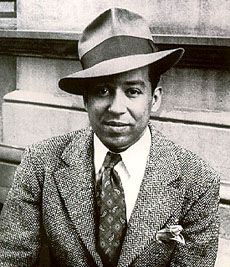 This issue of Beltway Poetry Quarterly honors one of the most well known American poets of the twentieth century, Langston Hughes. The issue falls on the 109th anniversary of Hughes birth (February 1, 1902 in Joplin, Missouri) and commemorates his impact on poetry as well as his time spent in Washington DC from November 1924 to February 1926.
This issue of Beltway Poetry Quarterly honors one of the most well known American poets of the twentieth century, Langston Hughes. The issue falls on the 109th anniversary of Hughes birth (February 1, 1902 in Joplin, Missouri) and commemorates his impact on poetry as well as his time spent in Washington DC from November 1924 to February 1926.
The poems selected for this issue celebrate Hughess legacy through poems about his life, poems written in his style, or on themes Hughes dealt with his work. Like Hughes, these poets have either lived or worked in the Washington DC area, in Maryland, Virginia or in the surrounding states of West Virginia or Delaware.
The issue is organized into five sections, each titled after a book written by Hughes. The first section, The Dream Keeper, taken from his fifth collection, contains poems in reflection of Hughes and in response to Hughess work. In her poem Fine Clothes To the Jew, Davi Walders examines different cultures influence on one another and suggests something overlooked in Hughes perspective on the Jewish experience. This poem is named for Hughess second published book of poems, which he worked on while living in DC. E. Ethelbert Miller also gives a stirring picture the poet as he describes a young Hughes tossing books into the ocean in Langston. A Dream Deferred poem is a must for any celebration of Langston Hughes, and Gowri Koneswaran obliges with Reverie Revealed, giving a possible answer to Hughess question as well. What happens to a dream? Maybe it writes the blues.
The second section, The Weary Blues, named after Hughess first published collection of poems, published while Hughes was a DC resident, celebrates music and the influence the Blues in particular had on Hughess work. Sarah Browning brings us the signature DC sound in her poem Doo Wop Hip Hop Go Go Clang” which is appropriately followed by Careless Love by Thomas Sayers Ellis, the king chronicler of Go-Go. Hughes would probably relish a metaphor-off with Kyle Dargan about what a song can really do, and discuss long into the night Brian Gilmores sugar mamma who gave the key to the highway. The section is concluded by Randall Hortons Blues Birthed into Go-Go in which a boy playing buckets outside a Green Line station hints at true Hughesian architecture of spontaneous, precious music in the city.
Hughes is well known for his writings about oppression of Africans and African-Americans. In the third section, Shakespeare in Harlem, named for a later book of Hughess poems, the poets give us their raw interpretations of the realities of racial injustice and inequity. Their words hold power in their specificity. Whether it is the missing dogs in Bonnie Auslanders The New Dog Map of the World or the blue birthplace of blackness in Holly Basss Indigo, their insights wont allow us to slip under the limbo stick of race as Reuben Jackson writes in his poem Green. In Kathleen S. Rogerss poem Buying all the Little Boys of Color where lawn jockeys are collected for proper burial, we are compelled to take in each syllable, each sentiment, each gutted image.
The final section, I Wonder as I Wander, named for Hughess second autobiography, celebrates Hughess continuing legacy with a series of reflective poems. Three poets, Hayes Davis, Jack Greer, and Joseph Ross, ponder the challenge of bringing poetry to teenagers in the classroom. Derrick Weston Brown reminds poets to stay true to the writing, lest they end up with overweight pot-bellied pig poems. The issue ends with a reflection by Luis Albert Ambroggio who suggestions that only one poetic voice will endure the passage of time. He writes: A tiny grain of sand in the eternal murmur of the ocean. A single shout.
The poets in this issue represent a variety of cultures, places of birth and social backgrounds. They help us honor a poet who appreciated the complexities of human nature. As Langston Hughes writes in his poem The Dream Keeper:
Bring me all of your dreams,
You dreamer,
Bring me all your
heart melodies.
And we do.
Special to this issue
“Langston Hughes in Washington, DC: Conflict and Class” by Kim Roberts
with a map of places Hughes lived and worked in DC by Emery Pajer
Table of Contents
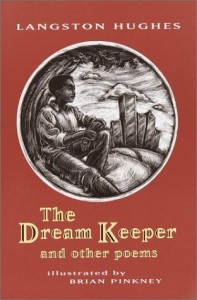 I. The Dream Keeper
I. The Dream Keeper
Reginald Harris, Living Room
E. Ethelbert Miller, Langston
Gowri Koneswaran, Reverie Revealed
Donald Illich, Daydream Variations
Meredith Pond, Nobody Here
Verna Taylor, Langston’s Voice
Ben Nardolilli, A Gal America
Dan Vera, For Some Executors of Gay Writers
Davi Walders, Fine Clothes to the Jew
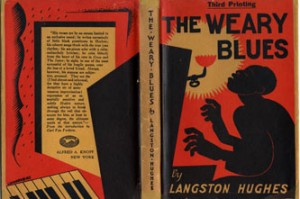 II. The Weary Blues
II. The Weary Blues
Sarah Browning, Doo Wop Hip Hop Go-Go Clang
Thomas Sayers Ellis, Careless Love
Phillip Calderwood, Cotton Farm Blues
Brian Gilmore, Chocolate City Blues
Kyle Dargan, Ooth Jazz
Randall Horton, Blues Birthed Into Go-Go
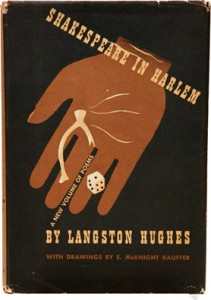 III. Shakespeare in Harlem
III. Shakespeare in Harlem
C.R. Resetarits, Dark Waters
Holly Bass, Indigo
Remica L. Bingham, My Mother Recalls Protests
Fannie Gray, The Trick
Kathleen Hellen, Why I weep for six white handkerchiefs
Bonnie Auslander, The New Dog Map of the World
Reuben Jackson, Green
Tammy Tillotson, Scare Crow
Gregory Pardlo, Double Dutch
Kathleen S. Rogers, Buying All the Little Boys of Color
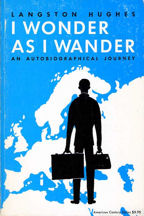 IV. I Wonder As I Wander
IV. I Wonder As I Wander
Regie Cabico, Learning to Be My Father’s Son
Kirsten Hampton, Color Wheel
Hayes Davis, America
Susan R. Williamson, No Help for It
Jack Greer, Schooled
Joseph Ross, On Langston Hughes’s “Theme for English B”
Yvette Neisser Moreno, How the Water Settles
Derrick Weston Brown, Your Poem
Luis Alberto Ambroggio, Por el poeta que sobreviva/To the Poet Who Survives